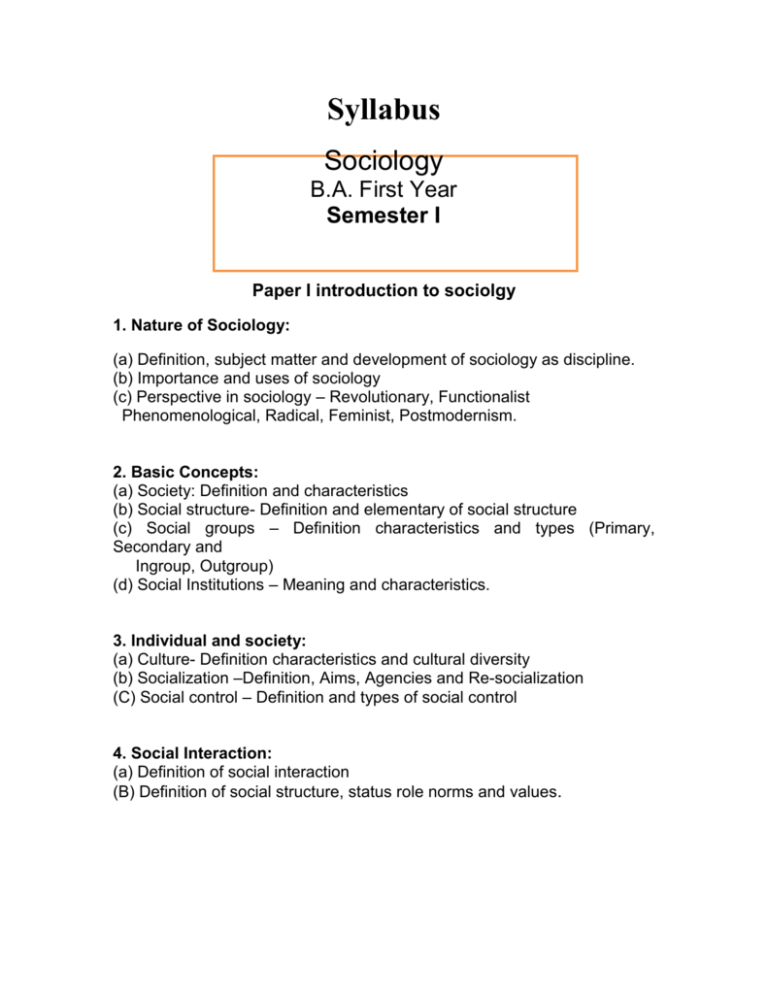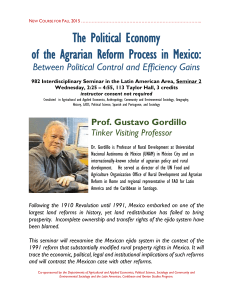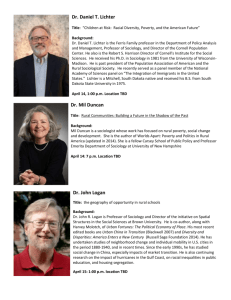Syllabus_Sociology
advertisement

Syllabus Sociology B.A. First Year Semester I Paper I introduction to sociolgy 1. Nature of Sociology: (a) Definition, subject matter and development of sociology as discipline. (b) Importance and uses of sociology (c) Perspective in sociology – Revolutionary, Functionalist Phenomenological, Radical, Feminist, Postmodernism. 2. Basic Concepts: (a) Society: Definition and characteristics (b) Social structure- Definition and elementary of social structure (c) Social groups – Definition characteristics and types (Primary, Secondary and Ingroup, Outgroup) (d) Social Institutions – Meaning and characteristics. 3. Individual and society: (a) Culture- Definition characteristics and cultural diversity (b) Socialization –Definition, Aims, Agencies and Re-socialization (C) Social control – Definition and types of social control 4. Social Interaction: (a) Definition of social interaction (B) Definition of social structure, status role norms and values. Paper II – Rural Sociology in India 1. Introduction: (a) Meaning, Nature and Scope of Rural Sociology (b) Development of Rural Sociology in India 2. Rural system in India: (a) Process- Parochilization, Universalization, Sanskritaization and little and great tradition (b) Agrarian relations – Traditional and Contemporary 3. Rural Social Structure and Dynamics: (a) Caste and Social Structure in India (b) Features of Dominant Caste. (c) Balutedari system- changing feature of village social structure. 4. Village as a Social System: (a) Physical and administrative characteristics (b) Social Stratification (c) Village Economy (d) Family and kinship relation (e) Customs and Tradition Semester II Paper III – Social Institutions and Modernization 1. Concept of Social Change and Modernization: (a)The need for relevance of a Sociological study of change (b) Modernization and Economic Development (c)Characteristics of modernization (d) Modernization in India 2. Process of Modernization: (a) Industrialization (b) Urbanization (c) Westernization (d) Secularization 3. Modernization and changing nature of Social Institutions: (a) Family: Basic concept, alternative family forms, and their changing nature (b) Marriage: Basic Concept and changing nature (c) Religion: Basic Concept and changing nature (d) Education: Impact of modernization (e) Political system: Indian political system and its changing nature (f) Economical system: ‘Economy’-a subsystem of society and its changing features 4. Features of Modernization: (a) Model of transition - The role of institutions, Elites, Values and Norms, (b) Social-Psychological orientations (c) Modernization in India - Relation between tradition and modernity Paper IV- Rural Transformation: Issues and Development 1. Major Rural Problems (a) Indebtedness, Literacy, Traditional Mindedness (b) Politicization of Panchayat Raj (c) Problem of Rural Leadership, 2. Rural Administration Administrative and Organizational aspect of Rural planning and development in India 3. Rural Reconstruction (a) Aims and objectives, (b)Pre-Independence and after Independence, (c)Genesis of Planning 4 Rural Development / Welfare programmes 1) Integrated rural developemt programme(IRDP) 2) Indira Awas Yojana, 3) Employment Gurennttee scheme 4) Suvarajaynti Gram Samridhi Yojana 5) Sant Gadgebaba Gram Swachta Abhiyan 6) Sarva Shikha Abhiyan. M.A. First Year Semester I Paper I - Thoughts and theories in Sociology 1) Central problems of Sociological Theories (a) Social order as the Central problem (b) Coercion theory (c) Interest theory (d) Value consensus theory. 2) Theories of Social Action (a) Max Weber's Typology of Social actions (b) Parson's action frame of reference (c) Pareto's logical and Non-logical actions. 3) Theories of alienation (a) Karl Marx (b) Seeman 4) Theories of anomic (a) Emile Durkheim (b) Robert K. Merton (c) Cloward Paper II - Research Methods in social Sciences 1. Scientific research The Nature of Scientific Method and its application to Social Research, Types of social research. 2. Universe and sampling Different Methods of Sampling, Social Surveys 3. Methods of social research Case study, Statistical method, Historical Methods 4. Data Collection Primary and Secondary Sources - Documents, Observation, Questionnaire and Interview 5. Data processing and tabulationEditing, Coding, Data distribution, Frequency Percentage and cumulative, tabulation- univariate, bivariate and multivariate Paper III - Rural Society in India 1. Approaches to the study of rural society (a) Modernization approach- index typical approach (b) Marxist approach (c) Diffusionist approach 2. Changing nature of Social Institution: (a) Family (b) Caste (C) Religion 3. Agrarian social structure and change(a) Agrarian class structure during pre-land reform period to present. (b) Rural Social problems – landless labour, Bonded labour, Migrant labour, and rural poverty. (c) Major causes of agrarian unrest and peasant movements in India. 4. Impact of globalization on rural economy (a) SEZ and problems of displacement (b) Decreasing subsidy III Sociology of Aging 1. Introduction to sociology of ageing (a) Nature, Scope and significance (b) Development of sociology of aging. 2. Theoretical perspectives on aging (a) Disengagement theory (b) Activity and continuity theory (c) Psychological models of the life course (d ) Social context and the life course 3. Basic Concepts: (a) Age grade (b)Aged women (c) Status of aged, (d) Old age homes. 4. Trends of increasing aging population (a) Trends of increasing aging population in tribal (b) Factors responsible for the same various implications of aging (c) Aging population for development and developing society. Paper IV - Political Sociology 1. Introduction to Political Sociology (a) Meaning, Nature and Scope of Political Sociology (b) Development of political sociology (c) Relationship with sociology and political science 2. Theoretical Approaches : (a) Behavioral Approach (b) System analysis approach (c) Input-Output approach (d) Post modernist approach 3.Political Participation : (a) Pressure group and interest groups (b) Political bureaucracy –characteristics and types. (c) Political Recruitment and political culture 4.Political process and Parties in India (a) Political Parties- characteristics and functions (b) Political Participation in India (C) Ideology and politics in India. Paper IV Sociology of Health 1. Introduction to sociology of health (a) Nature and scope of sociology of health (b) Development of sociology of health (c) Methods of sociology of health (d) Relationship between sociology and the health care institutions . 2. The (Scp) society- culture-personality model and the health care system (a) Culture and norms (b) Socialization and health care (c) Normal health and ill health (d) Primary – secondary support group 3. Medicine as an institution (a) Structure of the system (b) Medicine, nursing and pharmacy as professions. 4. The sick role and health care (a) The Parisionian viewpoint of the sick role (b) Acute and chronic sick roles, temporary and permanent sick role. (e) Health behaviors, illness behavior and sick role (d) Doctor- patient relationship Semester II Paper V - Theoretical reformation in Sociology 1. Modernization and post modernism a) Giddens, b) Dipankar Gupta 2. Modernaizatin of Indian Tradition a) Yogendra Singh 3. Ethnomethodolgy – a) Gartinkal 4. Phenomenological sociology a) Alfred Schutz b) Karl Mannheim 5. Structurea functional approach a) Parssons b) Merton VI- Advanced Social research methods 1. .Knowledge a) Meaning b) Types and significance 2. Major Paradigms (a) Positivistic - August Compte, Emile Durkhime, Karl Popper (b) Interpretative- Phenomenology, Ethno methodology (c) Critical – Marxism, Feminism 3. Qualitative research techniques (a) Participation observation (b) Case study method, (c) Content analysis. 4. Nature of social reality (a) Logic of inquiry in social science research theory building (b) Mode building constituting theory, scientific methods in social research (c) The problems in the study of social reality, objectivity and subjectivity. Paper VII- Rural Development in India 1. Concept of rural development: (a) Definition and scope of rural development, (b) need of rural development (c) historical evolution of the concept of rural development in Indian context 2. The role of agriculture in rural development: (a) watershed programme (b) command area development programme (c) Rural resources. 3. Rural industrialization in India: (a) Cottage and rural industries (b) Development of rural industries during plan period. (c) Sources of finance to rural industries 4. Rural infrastructures :Rural transport : (a) Rural transport and communication , (b) Rural electrification, (c) biogas programme, (d) Role of commercial and regional banks 5. Experiments in rural development before independence : (a) Shantiniketan (b) Sevagram Baroda firka Development, (c) Etawa pilot project. Paper VII Social context and care of elderly 1. Adaptation of retirement and senior activities : (a) Retirement transitions and life styles. (b) Family relationships and role relationships 2. Family relationships : (a) Friendships and widowhood (b) Household composition and residential changes. 3. Social networks and community: (a) Retirement communities and life care arrangements (b) Health problems and access to care 4. Health care and the medical system : (a) Medicare and financing health care (b) Public policy and federal initiative – the administration on aging 5. The Long term care continuum: (a) Family care giving and community, based serving (b) The residential institutional care continuum Paper VIII- Politics and society 1. Visions of Society and Politics: (a) The visions of Karl Marx, Max Weber and Pareto (b) New Political Sociology 2. Nature and types of political systems: (a) Conflict (b) Legitimacy (c) Effectiveness of these systems 3. Political socialization: (a) Nature (b) Significance (c) Agencies 4. Society and state in India (a) Religion Nationalism (b) Hindutva and politics of upper caste (c) Language, ethnicity and region Paper VIII - Health problems and Health Policies in India 1. Social problems and health care: (a) Health problems of the poor and minorities (b) Community health problem (c) Social class and mental, physical illness 2. Health and social problems : (a) Malnutrition (b) Maternal and child health (c) Sanitation problems (d) Mental illness (e) Aging 3. Health education (a) Objective and principles (b) Methods of health education (c) Population and sex education 4. Health policy in India (a) Health policy of Govt. in India (b) Drug control land adulteration Dissertation The present revision of M.A. Sociology syllabus of one paper M.A. Part I Data collection and analytical procedure has been done keeping in view the improvement in pedagogic, Methodologies to prepare students to make use of employment opportunities in NGO’s and to incorporate computer application in social research also that they are adequately trained to undertake research. Subject: 1. Crimes and criminal Justice 2. Deviance 3. Rural development 4. Families / Education / Religion 5. Economics and work 6. Power, politics and authority 7. Population urbanism and environment 8. Collective behavior and social movement 9. Social change and global perspective 10. Immigration 11. any contemporary sociological event your own choice (with prior permission of concern teacher)






